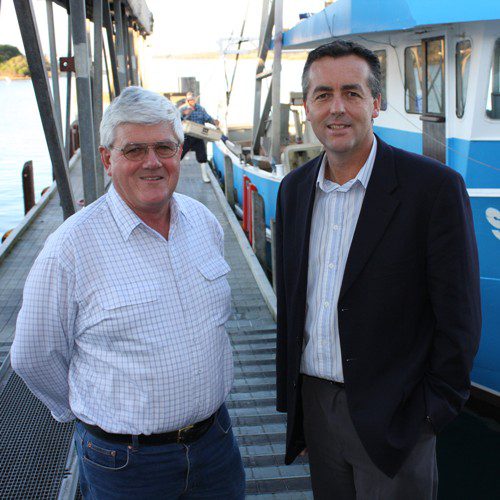LOCAL CATCH A SELLING POINT FOR SEAFOOD INDUSTRY
June 20, 2011
Promoting locally caught seafood to support the fishing industry in Lakes Entrance is on the agenda of the Federal Government.
The Nationals Member for Gippsland Darren Chester last week put the question directly to the Agriculture, Fisheries and Forestry Department over growing concerns within the industry in relation to the lack of transparency in country of origin labelling for cooked seafood.
Mr Chester said the concerns stemmed from the fishing industry which believed that restaurants and clubs should be required to declare the origin of seafood to allow customers to make a more informed choice.
“People are becoming more and more aware of where their food comes from,” Mr Chester told Parliament.
“There is a concern, particularly in our restaurants and clubs, that there are products being sold as the ‘fish of the day’, and people are under the misapprehension that they may be buying a fish that was caught locally, when in fact it is an imported product.
“It is important that people can be confident in the source of their food, and the deceptive conduct which is currently underway in some of our clubs and restaurants to suggest that some of the products are coming from Australian waters is unfair to local product.
“The seafood industry has no problem with the fact that we are going to have imported product in the market place. But in the interests of industry and consumer fairness, it is an issue that the government is going to have to deal with sooner rather than later by providing clear labelling so that consumers can be confident in the country of origin of the product they are eating.”
The Acting Minister for Agriculture, Fisheries and Forestry Tony Burke responded to Mr Chester highlighting the example of the Northern Territory where country of origin labelling on seafood had been used successfully to provide benefits to both the industry and retailers.
“We need to remember the extent to which overseas competition is real for the seafood industry,” Mr Burke said in response to Mr Chester’s question.
“It is extraordinary that, while we export a lot of very high value seafood, a large amount of seafood consumed in homes and in restaurants is in fact imported.
“While when you go to the supermarket or to the local fish shop you have country of origin labelling, there is a presumption when people go to restaurants that they will be receiving fresh food and a presumption that most people have, particularly when they are in fishing communities, that what is sold locally is in fact locally caught.
“It has been a running sore for a long time in terms of not only the economic value but also people feeling a sense of deception when they go to a fishing village or town.
“When it was first introduced in the Northern Territory much of the restaurant industry was quite resistant to having to put the country of origin on the menu.
“But what ended up happening was they did not just put country of origin, they started to put town of origin, they started to put village of origin and they started to put precisely where something had been caught, because there is no greater selling point for seafood than that it is local.
“People know that, with the purity of the oceans we have in Australia, there is a purity of product that follows.”
Mr Chester said he would continue to push the case for mandatory country of origin labelling for seafood to support the local fishing industry and provide consumers with accurate information.
“Customers have a right to know what they are eating and where it has come from and our local fishing industry would benefit from people making an informed choice when they order their meals,” he said.

